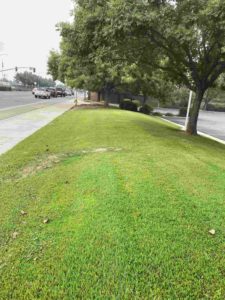PLG Police Brutality Lawyers File Excessive Force Lawsuit Against Fresno County Sheriff’s Office
Last week, police brutality lawyers from the Piccuta Law Group filed a new excessive force lawsuit. The lawsuit was filed on behalf of the firm’s client and against the Fresno County’s Sheriff’s Office and one of its deputies. The deputy that was named in the lawsuit is Gregory Little.
The lawsuit was filed in Fresno County Superior Court and is entitled Kaur v. County of Fresno, Et Al. The police brutality lawsuit was designated Case # 21CECG02969. The presiding judge to which the case was assigned is the honorable Kristi Culver Kapetan.
Details Regarding the Police Brutality Case
On August 20, 2020, the firm’s client was pulled over by a Fresno County Sheriff’s deputy. At the time, the client was a 37-year-old mother who was gainfully employed as a registered nurse. The client would later learn that the deputy who pulled her over and assaulted her was Gregory Little.
The routine traffic stop occurred in the City of Clovis. Deputy Little initiated the stop of the firm’s client for allegedly failing to wear her seatbelt and driving while using a cell phone. When the client questioned the officer as to the reason for the stop and claimed innocence, Deputy Little ignited. He responded by dragging the client from her vehicle to the grass alongside the shoulder of the road. While doing so, Deputy Little struck the client in the head and back.

When they reached the side of the road, the client assumed the fetal position and tried to protect herself. Deputy Little then forced her head into the ground and pressed his knees into her back. Fearful for her life, the client, who had grabbed her cell phone as she was being pulled from her car, dialed 911. This infuriated Little, who then seized her phone during the call and threw it aside. The client was arrested and taken to jail where she was cited for numerous Vehicle Code violations and for resisting arrest under California Penal Code Section 148(a)(1). However, no charges were ever filed and no police report was ever created or produced.
The Allegations Claimed In the Excessive Force Lawsuit Against the Fresno County Sherriff’s Office
Below are the actual allegations taken directly from the police brutality lawsuit our civil rights attorneys filed:
- On August 20, 2020, at approximately 4:00 p.m., Kaur was operating her motor vehicle in the #1 lane near the intersection of Tollhouse Lane and Fowler Avenue in Clovis, California.
- At this time, Officer Little was on duty in a marked Fresno Sheriff’s Office patrol vehicle next to Kaur in the #2 lane. Officer Little activated his patrol vehicle’s lights and initiated a traffic stop of Kaur.
- Kaur complied and immediately began slowing her vehicle to a stop on the shoulder of the road. Officer Little then parked his patrol unit, approached Kaur’s passenger side window and asked for her driver license and proof of insurance.
- Kaur asked Officer Little what she had done wrong. This angered Officer Little, who impatiently responded that Kaur had not been wearing a seatbelt and had been on her phone while driving.
- Contrary to Officer Little’s implication, Kaur was not using her phone in violation of California law. As such, Kaur informed Officer Little that her phone was in a basket. She then asked what proof he had that she was on her phone.
- This caused Officer Little to grow even angrier and to tense up. He then walked around the back of Kaur’s vehicle and aggressively approached her driver side door.
- Kaur then opened her car door in an attempt to indicate compliance and to show that she had nothing to hide. She then remained seated and still in her seat as Officer Little approached.
- Without a word, Officer Little initiated physical contact with Kaur by seizing her left wrist. As he did so, Kaur fearfully gripped the steering wheel and asked Officer Little what he was doing and what was going on. She then pleaded that she would give him whatever he wanted and would not question him further.
- Officer Little then ripped Kaur from the car and threatened that her time was over and that she was headed to jail. Kaur exclaimed that she had only asked him two questions.
- Kaur was then dragged by Officer Little to the grass on the side of the road. As he did so, he delivered strikes to Kaur’s head and back.
- When they reached the grass, Kaur assumed the fetal position to protect herself as Officer Little pushed her head into the ground and pressed his knees into her back.
- Kaur had been able to grab her phone with her right hand before she was pulled from the car. Kaur dialed 911 and alerted the dispatcher that an officer was hitting her and abusing her.
- Officer Little responded by becoming angrier and taking Kaur’s phone and throwing it aside.
- Other officers arrived at the scene, and Kaur was arrested and placed in the back of a patrol unit. Kaur was then transported to jail where she was cited by Officer Michael Mason for numerous Vehicle Code violations and under California Penal Code section 148(a)(1).
- At no time during the encounter did Kaur willfully resist, obstruct or delay Officer Little from performing his lawful duties. Consistently, no charges arising from the subject-incident were ever filed against Kaur.
- In the course of a traffic stop, Officer Little violently attacked Kaur for no apparent reason other than as a punishment for questioning and seeking clarity as to what she had done wrong and for dialing 911 when she felt her life was in danger. Officer Little intended that his conduct cause injury to Kaur. Further, his conduct was despicable and was carried out with a willful and conscious disregard for Kaur’s rights. The conduct also subjected Kaur to cruel and unjust hardship in conscious disregard of those rights.
Claims Advanced by our Police Brutality Lawyers in the Excessive Force Lawsuit Against the Fresno County Sheriff’s Office
Based on the above facts, our police brutality and civil rights lawyers asserted two claims for several violations of the client’s rights. The first claim asserted in the excessive force lawsuit was for violations of California’s Tom Bane Civil Rights Act. The second claim asserted was for battery by a peace officer.

Our civil rights attorneys alleged that, Deputy Little’s intentional, coercive and violent acts deprived Kaur of her rights under the First and Fourth Amendments to the United States Constitution and article I, sections 2 and 13 of the California Constitution. Both the United States Constitution and California’s Constitution protects citizens from certain wrongful conduct by law enforcement officers in the performance of their duties.
A Law Enforcement Officer Can Not Retaliate Against Someone for Exercising Free Speech
Both the California Constitution and the First Amendment to the United States Constitution make it unlawful for police to use physical force to punish someone from voicing his or her opinion. Citizens may communicate their opinions to police and even criticize their actions. Citizens may even curse at police and call them derogatory names. Police are trained to deescalate situations and tolerate verbal commentary from citizens.
The First Amendment to the United States Constitution and the California Constitution guarantee a person’s right to exercise free speech. If a police officer uses physical force against someone for exercising his or her right to free speech, it is a violation of the First Amendment and California Constitution. Likewise, if a law enforcement officer retaliates against someone for protected speech, that is a violation of a person’s rights.
The retaliation need not be physical. It can include an arrest, a detention or other actions that do not include the use of force. The test is whether or not the actions of the officer would “chill a person of ordinary firmness” from exercising free speech. In other words, were the actions of the officer such, that a person would not want to express his or her opinion that way again.
A Law Enforcement Officer Can Not Use Unreasonable Force or Excessive Force
The Fourth Amendment to the United States Constitution and the California Constitution protect individuals from illegal search and seizure. When excessive force is used on an individual it violates these rights. Although no items are being seized, it constitutes a seizure of the person and his or her freedom.
Although no items are being seized, it constitutes a seizure of the person and his or her freedom.
What constitutes excessive force depends on how the claim is asserted. The standard for what constitutes police brutality under Federal law can differ from the standard for what is considered excessive force under California law. Claims for excessive force under California law are brought via the Tom Bane Civil Rights Act. This Act requires specific intent. In other words, the officer had to have the specific intent to violate the victim’s rights.
Federal excessive force or police brutality claims are brought pursuant to a federal statute 42 U.S.C. § 1983. To prevail on these claims, a person typically must show two things. First, that the conduct of the officer was objectively unreasonable. Second, that an officer would know such conduct was unreasonable or that there was a previous case, with similar facts, making it known that the conduct was unreasonable.
What is Battery by a Peace Officer aka Battery by a Police Officer?
A battery is an intentional and unlawful touching of an individual by another. Battery by a peace officer is nothing more than when a law enforcement officer is responsible for the intentional unlawful touching. To prevail on a claim for battery by a police officer you must prove the following:
- That the officer intentionally touched you;
- That the officer used unreasonable force to affect your arrest, prevent your escape or overcome your resistance;
- That you did not consent to the use of that force;
- That you were harmed; and
- That the officer’s use of unreasonable force was a substantial factor in causing you injuries.
What May Be Recovered in a Police Brutality Lawsuit?
A person can receive compensation for injuries that they suffered in a police brutality lawsuit. This includes amounts for medical expenses, lost wages, pain and suffering, emotional distress, among other things. In addition to this, both Federal and California police brutality claims allow a person to recover his or her reasonable attorney fees incurred.
This means that if a person prevails in his or her police brutality lawsuit, the winning attorney has the right to ask the court to award fees for all time spent in obtaining the result. In addition, under the Tom Bane Civil Rights Act, the losing police officer may have to pay a statutory penalty of $25,000 for violating the Act. Further, under the Tom Bane Civil Rights Act, a person is allowed treble damages which are additional amounts that a jury may award. A jury may award treble damages up to three times what was originally awarded to compensate the victim.
The statutory penalty and treble damages discussed above do not apply under a Federal civil rights claim. However, both Federal and State civil rights claims provide that someone may recover punitive damages from the guilty law enforcement officer.
Punitive damages are damages that a jury my award to punish a defendant and deter them from repeating the conduct in the future. Several factors are analyzed in awarding punitive damages. One of which is the ability for the law enforcement officer to pay such an award.
Contact Our California Police Brutality Lawyers to Discuss Your Police Excessive Force Case
If you or a loved has experienced police brutality, contact one of our police excessive force attorneys today. Our civil rights attorneys have a proven track record of handling serious police excessive force cases. Our police brutality attorneys have repeatedly obtained high dollar settlements against police departments and agencies throughout California. We have also obtained law enforcement misconduct verdicts in both state and federal court. A consultation is free and an experienced police brutality attorney is available now. Call us today.
About the author: The content on this page was written by California police brutality attorney and Monterey civil rights lawyer Charles “Tony” Piccuta. Piccuta graduated with honors from Indiana University-Maurer School of Law in Bloomington, Indiana (Previously ranked Top 35 US News & World Report). Piccuta took and passed the State bars of Arizona, California, Illinois and Nevada (all on the first try). He actively practices throughout California and Arizona. He is a winning trial attorney that regularly handles serious personal injury cases and civil rights lawsuits. He has obtained six and seven figure verdicts in both state and federal court. He has been recognized by Super Lawyers for six years straight. He is AV Rated by Martindale Hubble. He is a member of the Consumer Attorneys of California, American Association for Justice, National Police Accountability Project, Arizona Association of Justice, and many local county and city bar associations.
Disclaimer: The information on this web site is attorney advertising and is for informational purposes only. It does not constitute legal advice. Reading and relying upon the content on this page does not create an attorney-client relationship. If you are seeking legal advice, you should contact our law firm for a free consultation and to discuss your specific case and issues.
References:
[1] https://leginfo.legislature.ca.gov/faces/codes_displaySection.xhtml?sectionNum=52.1.&lawCode=CIV
[2] https://www.law.cornell.edu/uscode/text/42/1983

